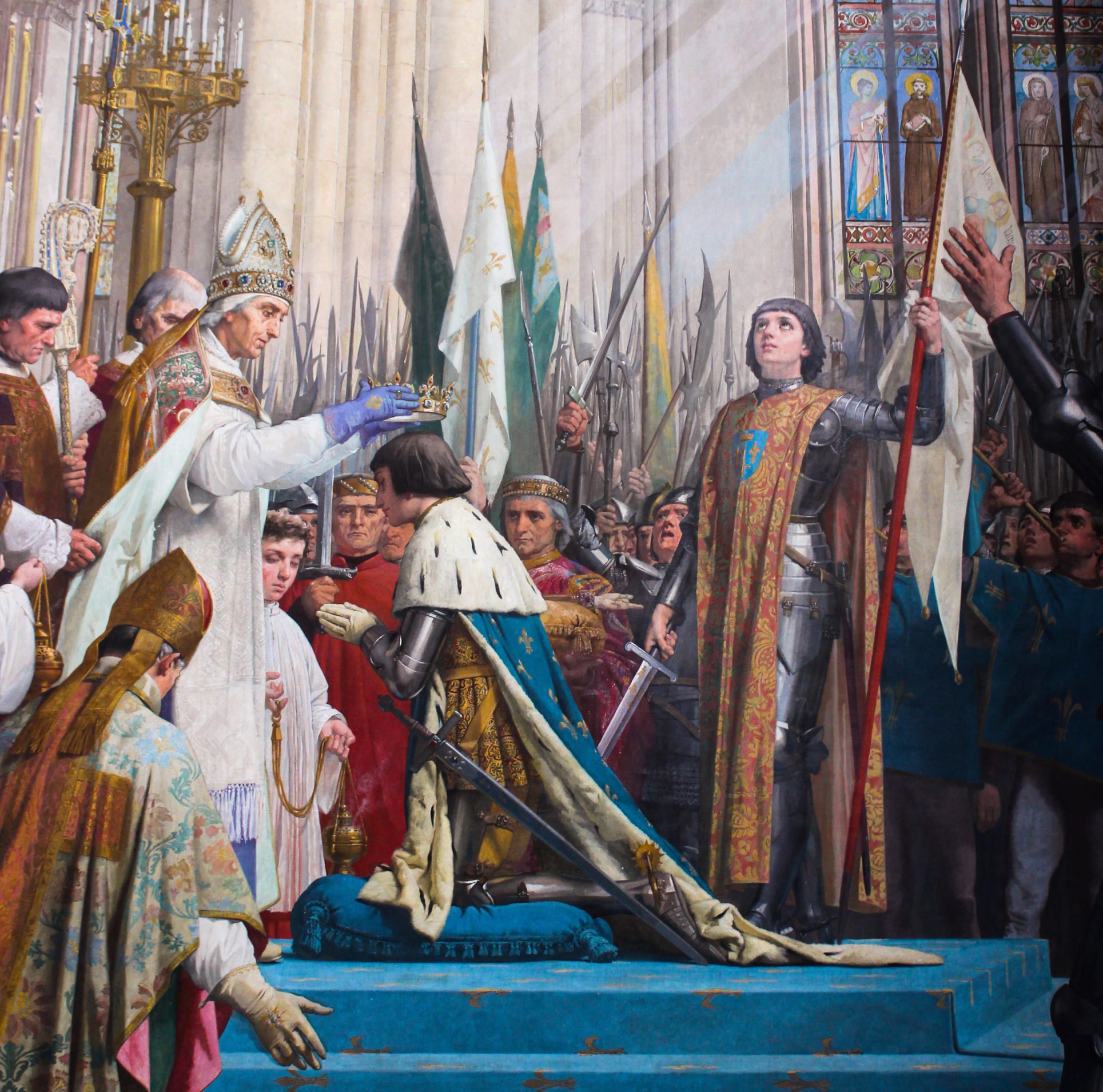Most Catholics, I have concluded, do not have trouble accepting the fact that St. Joan of Arc donned male apparel and led armies to victory. What seems to disturb many people, however, is that she gave her help to a king, and worse yet, to a King of France. Many Americans seem to be convinced that monarchy is an intrinsically evil institution. They are not able to see beyond their own time and their own political process. I recently read a comment in which someone said that St. Louis of France was a saint "in spite of being a king." May I be so bold to say that St. Louis saw his kingship as a vocation in which he served God and man. What is more, he saw it as a calling to share in the Kingship of Christ, from Whom he held his authority and to Whom he had to render an account. St. Joan, in her simple piety, viewed kingship in a similar manner. She honored her King Charles VII, although he was far from being a saint, because in doing so she gave honor to Christ the King. The office was deserving of respect, even if the man was not. On her banner she bore an image of Christ the King surrounded by the fleur de lys, the lilies of royal France.
In a small volume entitled Joan of Arc In Her Own Words there are many quotations of St. Joan which make explicit reference to the fact that she was called to serve God by assisting the French monarch. She said: "[St. Michael] told me the pitiful state of the Kingdom of France. And he told me that I must succour the King of France." To Robert de Baudricourt she insisted: "The Kingdom of France is not the Dauphin's but my Lord's. But my Lord wills that the Dauphin shall be made King and have the Kingdom in custody. The Dauphin shall be King in spite of his enemies, and I shall lead him to his anointing." She welcomed the Duc d'Alencon by saying: "The more there are gathered together of the blood of the King of France, the better it will be." In her letter to the English lords, Joan dictated: "Do justice to the King of Heaven; surrender to the Maid, who is sent here from God to uphold the blood royal."
Joan placed great store upon the mystical aspects of the coronation ceremony, telling the royal council: "When once the King is crowned and anointed, his enemies' strength will steadily grow less, and finally they will have no power to harm him or the Kingdom." At her trial she announced: "As for the good work I have done...I must needs leave that with the King of Heaven, who sent me to Charles, son of Charles King of France, who shall be King. And you shall see that the French will very soon achieve a great task which God will send to the French, and such that almost the whole Kingdom of France will tremble. And I say it, so that when it comes to pass it will be remembered that I said it." The Maid believed her country had a mission from God, a task to fulfill.
There are also some odd connections between St. Joan and Queen Marie-Antoinette. At first glance no two people appear to be as different from each other as the Habsburg archduchess and the peasant girl from Domremy, other than a shared love for children and needlework. Joan has often been referred to as the "Maid of Lorraine" or even as "Joan of Lorraine." Father Jean-Marie Charles-Roux, in building a case for the martyrdom of Marie-Antoinette in his book Louis XVII: La Mère et l'Enfant martyrs, points out that the queen's full name was Marie-Antoinette-Josephe-Jeanne de Lorraine, even as the Maid was Jeanne de Lorraine. Both women were called to their "mission" at age thirteen. At thirteen, Joan began to hear her voices; at thirteen, Marie-Antoinette was told she was to marry the heir to the French throne. Both were known for their staunch purity, and yet both were branded by enemies with the epithet of "whore." Both the queen and the peasant have had their reputations shredded beyond recognition. Both suffered the ordeal of a long imprisonment in which they suffered outrages against modesty. Both were forced to defend themselves against calumnies and half-truths amid the scrutiny of a public trial. Both persisted in their loyalty to the Holy See. Both were condemned to an ignominious death and each were taken to the scaffold in a cart. Unlike St. Joan, Marie-Antoinette never had a posthumous retrial. She was never officially vindicated and her name continues to be slandered in books and movies to this day. May the prayers of St. Joan bring the truth to light.




















